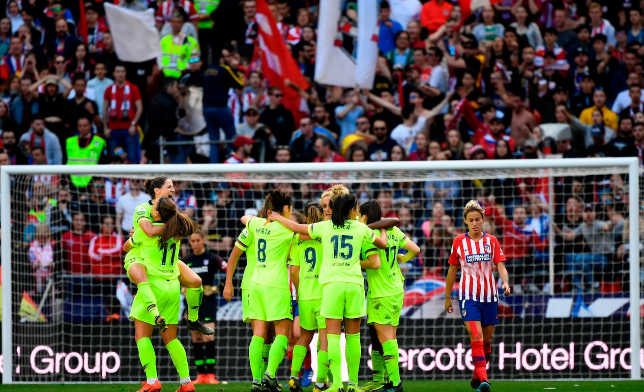Women Footballers in Spain Go on Strike Demanding Salary Reforms and Maternity Benefits

The strike by Spain's women footballers is for their day to day professional careers, a right to a decent standard of living and an unwillingness to acquiesce to the demand for professional standards without the contracts and pay to reflect it.
Footballers in the women’s Spanish top flight pressed ahead with their strike this weekend, after failing to negotiate a new collective agreement with the clubs over pay and other benefits. The strike meant eight games of the Primera División were postponed, including Barcelona’s trip to Real Sociedad and Atletico Madrid’s game at Valencia.
Over 200 players from 16 clubs voted to go on strike last month, following a year of failed negotiations over minimum salary and part time contracts between the AFE, the league body, the Association of Women’s Football Clubs (ACFF), and Spain’s football federation (RFEF).
In May this year, Barcelona and Atletico Madrid had set the record for the highest attendance for a women’s club football game. The team’s clash was shifted out of Atletico women’s home ground and held instead at the Wanda Metropolitano — the club’s official home stadium — and saw an attendance of over 60,000 fans.
Also Read | FIH, Hockey India Set to Gloss Over Cracks With Another Desi World Cup Spectacle
The AFE, in its negotiations, had asked for an increase in minimum salary from €16,000 (Rs. 12.7 lakh) a year to €20,000 (15.8 lakh). But the biggest stumbling block has been the failure to reach an agreement on part-time contracts. The players demand was that part-time contracts (30 hours per week) have a minimum salary of €12,000 (9.5 lakh) — 75% of the full-time salary. The clubs argued it should be €8,000 (Rs. 6.3 lakh) or 50%.
These wages may be higher than Spain’s minimum wage of approximately €12,600 a year for 2019, but are significantly lower than the average wage of Spanish workers which is €23,000, according to the country’s office of national statistics. Players from different clubs — regardless of their financial benefits and the club’s financial state are also backing the push for a collective bargaining agreement which would include maternity leave and paid time-off.
There exists the fear that clubs will struggle to pay, in particular the four teams without the backing of a men’s club — Madrid CFF, Sporting de Huelva, Logroño and UDG Tenerife — but that brings into focus the sustainability of the league itself. According to reports, clubs receive €350,000 a season from the federation and are offered €500,000 by the league for their TV rights.
Video | India Scrape a Point vs Afghanistan: FIFA World Cup Qualifier Review With Renedy Singh
In the meeting in November, Mediapro, the broadcaster which holds the league’s broadcast rights for 12 of the 16 teams, offered €1.5m to fund the wage shortfall and end its exclusive contract. The Spanish FA was not willing to allow Mediapro to retain any broadcast package, and would only agree to a deal that saw the RFEF reclaim all commercial rights from the ACFF, in return for plugging the funding deficit.
Last week, at the announcement for the strike, the Spanish players’ union, the AFE, posted a video on Twitter featuring a number of top-flight players, including Spain and Atlético midfielder Silvia Meseguer advocating for change. Players say they are fighting for former and current colleagues, and “for those who will one day be in our place”.
The strike is hugely significant and shifts a change in mindset regarding the women’s professional game. There have been strikes and player protests before but these have often revolved around the conditions and pay of national teams.
In 2017, Republic of Ireland players threatened action after going public on having to change in airport toilets and sharing tracksuits when on national duty. The same, year Denmark players forfeited a World Cup qualifier against the Netherlands while in a pay dispute with their football association — a decision which ultimately cost them a place at the World Cup in France after they finished second in the group and lost in the play-offs for the remaining place.
Also Read | Kalin Bennett Becomes First Player With Autism to Play Division 1 Basketball in NCAA
Members of the Nigeria national team held a sit-in at their hotel after this year’s World Cup exit to demand outstanding expenses be paid. They did the same after winning the Afcon in 2004 and again in Cameroon in 2016.
It is telling that where women players are demanding equal pay and contracts globally, it is mostly with regard to the way they are treated with the national team. On the other hand, this strike is for their day to day professional careers, a right to a decent standard of living and an unwillingness to acquiesce to the demand for professional standards without the contracts and pay to reflect it.
Get the latest reports & analysis with people's perspective on Protests, movements & deep analytical videos, discussions of the current affairs in your Telegram app. Subscribe to NewsClick's Telegram channel & get Real-Time updates on stories, as they get published on our website.
























